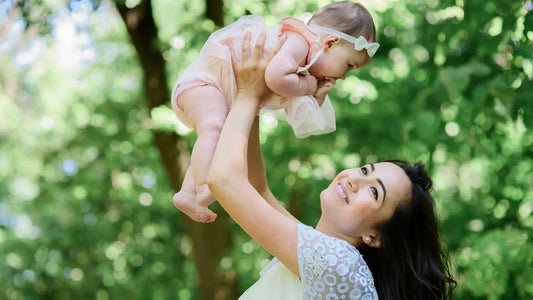Common Baby Allergies: What Parents Need to Know
Witnessing your newborn struggle with allergies is one of the most heartbreaking experiences a parent can go through. That tiny, congested breathing and flushed cheeks can honestly make us feel helpless sometimes. But don't worry mama, we’re here to help you! If you suspect your newborn is suffering from allergies but aren't sure what's triggering their symptoms, you're in the right place. We'll cover common culprits behind infant allergies as well as some gentle, time-tested solutions to identify and manage your baby's specific triggers.
Let's start by understanding what allergies look like in newborns and how they differ from older children and adults.
Signs and Symptoms
Since their brand-new immune systems are still developing, newborns often display different allergy symptoms compared to older babies and kids. In fact, many allergic reactions in the first few months simply look like general fussiness or discomfort. Common newborn allergy symptoms to watch for include:
- Congestion, runny nose, sneezing
- Wheezing, difficulty breathing
- Persistent coughing or hiccups
- Red, itchy, or irritated skin/rashes
- Swollen eyes, eyelids
- Diarrhea, vomiting, gas, bloating
- Excessive drooling or spitting up
- Inconsolable crying, irritability
Potential Newborn Allergy Triggers
Here's a quick primer on some of the more prevalent allergens to watch for:
- Foods: Eggs, dairy, peanuts, tree nuts, wheat, soy, and seafood rank among the most notorious food allergy offenders, even in breastfed babies.
- Environmental Triggers: Pollen, mold, dust mites, and pet dander irritants are everywhere! Living in clean, dry climates helps minimize natural allergic assaults.
- Irritants & Chemicals: Fragrances, dyes, cleaning products, and other harsh substances in baby care items are major culprits for sensitized skin.
- Airborne Illnesses: The common cold, flu, and other respiratory viruses can actually trigger and exacerbate allergy symptoms initially.
- Parent Allergens: Kids commonly inherit heightened allergic sensitivities to things like pollen, nuts, dairy etc. if one or both parents have allergies.
While not an exhaustive list, being mindful of common allergen hotspots during those first few years allows you to steadily eliminate and identify problematic triggers.
Tips for Preventing and Managing Allergies
Of course, completely shielding babies from all potential allergens is pretty much impossible - those pesky triggers really are everywhere! However, some proactive preventative measures can go a long way:
- Breastfeed if Possible: Breast milk naturally transfers antibodies and key nutrients to fortify those naive defenses.
- Allergen-Free Home: Don't bring top allergens like peanuts into the home until you've confirmed an absence of infant allergies to them.
- Stringent Hygiene Practices: Make sure hand-washing, sterilizing surfaces, and laundry hygiene habits aim to limit allergen exposures.
- No Outside Shoes In: Even dirt and allergens from foot traffic can drastically increase indoor microbe levels, so leave shoes at doors.
- Disinfect Frequently: Baby toys, surfaces, and your own hands all harbor lingering germs, so keep things sanitized regularly.
- Stay Ahead on Vaccines: While most don't start until 2+ months, skipping any can create preventable vulnerability.
- Proper Sleep Schedule: Sleep deprivation weakens the immune response, leaving your baby more vulnerable to allergies.
- Don't Smoke Around Baby: Any kind of smoke or air pollution directly undermines respiratory defenses.
Conclusion
Each of those childhood illnesses essentially serves as an introductory "course" for their inexperienced immune system to learn how to properly identify, fight off, and develop immunity against those allergens. With some trial and error plus guidance from your pediatrician, you can absolutely find that sweet spot of relief.
You've got this, parents! Better days of peaceful cuddles are right around the corner.
Shop for the Best Baby Care Products
FAQs
1. What are common signs of allergies in newborns?
Ans. Common signs include congestion, runny nose, sneezing, wheezing, difficulty breathing, rashes, swollen eyes, diarrhea, vomiting, excessive drooling, and inconsolable crying.
2. What are some common allergens for babies?
Ans. Common allergens include certain foods (like eggs, dairy, peanuts), environmental triggers (pollen, mold, dust mites), irritants and chemicals in baby care products, and airborne illnesses.
3. Can babies inherit allergies from their parents?
Ans. Yes, kids can inherit heightened allergic sensitivities if one or both parents have allergies.
4. Is it possible to completely protect babies from allergens?
Ans. No, it's nearly impossible to shield babies from all potential allergens, but preventative measures can help reduce exposure.
5. Why do newborns show different allergy symptoms compared to older children?
Ans. Newborns' immune systems are still developing, so they often display different and more general symptoms of allergies compared to older children.




